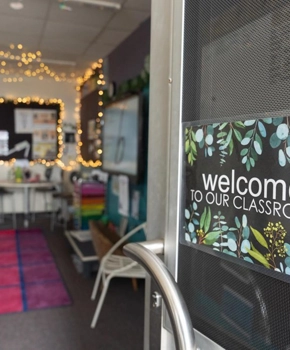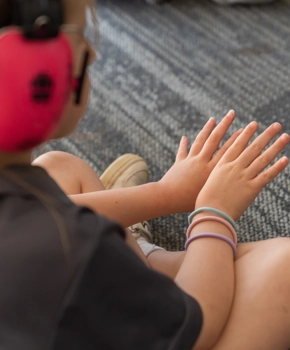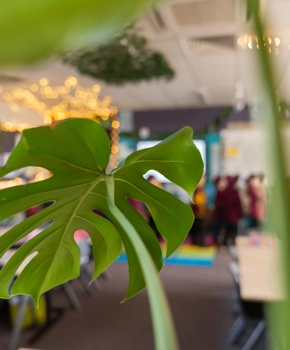Neurodiversity is about celebrating and embracing difference and diversity across humankind, and looking at how we can support neurodiversity across all contexts.'
Autism
Providing support to children and young people, families and schools
Autism is a form of neurodiversity – a different way of thinking, behaving, learning and interacting with others. These resources provide information for families, educators and students to support young people who may or may not have an autism diagnosis during their schooling.
Autistic artist Freya Pinney created this image, titled 'Interconnections'. The painting explores how it feels to be supported and to offer support, representing the interconnections between being heard, seen, accepted and developing understanding.

Topics
Starting School
These resources aim to help educators of students on the autism spectrum (diagnosed or undiagnosed) prepare for the first year of schooling.
Read more

Interoception and self-regulation
Support children and young people to to feel more connected to their bodies, and to interpret and express their emotions helpfully.
Read more

Autism: Respectful relationships
Respectful relationships modules covering years 5-9. Each module includes background information, teaching activities and links to additional specialised resources.
Read more

Autism: Resources for families
Resources to support parents and carers of Autistic children and young people.
Read more

Webinars
Starting school: Webinar recording
This webinar introduces the new resource Starting school hosted on the Student Wellbeing Hub. The resource is designed to assist familes and educations of students with autism (diagnosed or undiagnosed) as they begin the first year in primary school.
Relationships education for students with autism
In this webinar recording, Dr Emma Goodall discusses strategies for teaching students with autism about relationships and topics related to personal development.
Supporting self-regulation skills in the classroom: Webinar recording
This webinar explores how building interoception skills can help children and young people to self-regulate their emotions and feelings, be calm and engage with learning, have positive wellbeing, and improve their academic performance.
Featured resources
Brain break bops
Short animated videos featuring an interoception movement, plus other fun dance moves and memorable song lyrics.
Assess your classroom environment
This interactive tool recommends simple changes which can make your classroom a more inclusive space.
Understanding neurodiversity and autism
In this video, experts, autistic people, and parents of autistic children talk about what neurodivergence and autism mean to them and reflect on their experiences.
What is interoception?
Interoception or 'mindful body awareness' is thought to be a prerequisite for self-regulation. In this video, educator and researcher, Dr Emma Goodall introduces the concept.
Interoception and self-regulation: Professional learning for educators
This free online course is suitable for primary and secondary educators with an interest in supporting children and young people with emotional self-regulation, mental health and wellbeing, and social and emotional skills.
